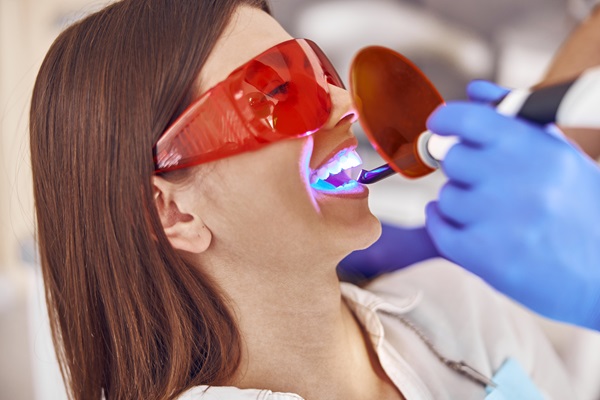How Does a Dentist Use Laser Dentistry for Dental Cleaning?

Laser dentistry is a relatively young concept that can target diseased soft tissue and improve the health of gums, jawbone, and more. Dental lasers are approved by the Food and Drug Administration (FDA), and the risks of the procedure are minimal. Subsequently, dentists often recommend laser dentistry for deep dental cleaning procedures.
Laser dentistry and dental cleaning
A routine dental cleaning removes plaque and tartar build-up along the gum line and on the surface of teeth. A deep dental cleaning actually cleans below the gum line. Traditional methods of deep dental cleaning can cause discomfort, and laser dentistry offers a way to minimize the pain and recovery time for a deep dental cleaning procedure.
What is laser dentistry?
Laser dentistry is an alternative method of dental treatment that uses highly focused light energy beams to remove or reshape tissue, bone, and more. Laser dentistry is a safe and effective alternative for patients that do not like the sound and feel of dental drills and other instruments.
How is laser dentistry used for dental cleaning?
As mentioned, laser dentistry is used for deep dental cleaning more than it is used for regular dental cleanings. During the procedure, the dentist uses dental lasers to target and remove plaque and tartar build-up along and beneath the gum line. This is done without harming any healthy gum tissue and without causing the gums to separate from the teeth.
Laser dentistry vs. traditional methods
Laser dentistry for dental cleanings does not require the use of any dental tools other than the FDA-approved dental lasers. This means there is no need for the more invasive dental tools often used with traditional methods, such as dental drills. This procedure also does not cause much, if any, discomfort, whereas traditional methods are much more likely to cause swelling, pain, and bleeding.
Is laser dentistry safe?
As mentioned, the use of laser dentistry for dental cleanings is approved by the FDA. Dentists also go through extensive training to help ensure the optimal safety and effectiveness of the procedure. Subsequently, the risks of deep dental cleaning with laser dentistry are minor, and most patients do not experience any adverse effects. In fact, the opposite is often true. Many patients report less discomfort and faster healing times with laser dentistry.
How to keep teeth and gums clean after your cleaning
Patients can protect their teeth and gums by brushing and flossing regularly after a dental cleaning. Regular visits to the dentist for routine cleaning are also highly encouraged, along with making smart dietary choices, such as avoiding foods and drinks that are high in sugar and other carbohydrates.
Schedule a visit for a laser dentistry dental cleaning
If you still have questions about laser dentistry or would like to schedule a visit for a dental cleaning either with lasers or through traditional methods, then reach out to our dental practice today. We are glad to answer your questions and help you decide on the best treatment option for you.
Request an appointment here: https://www.dentalexcellencegroupnj.com or call Dental Excellence Group at (201) 244-7244 for an appointment in our Dumont office.
Check out what others are saying about our dental services on Yelp: Laser Dentistry in Dumont, NJ.
Related Posts
Laser dentistry offers an alternative to ultrasonic drills by using focused light to remove tooth decay, shape tissue, and sanitize surfaces. Although the traditional drill delivers reliable results for many dental needs, dental lasers have improved the effectiveness of conservative techniques and patient comfort. A trusted dentist can recommend one approach over the other after…
Gum recession is a common dental condition where the gum tissue surrounding the teeth pulls back, exposing more of the tooth or its root. Understanding the causes of gum recession is essential for prevention and treatment. By addressing this issue promptly, a periodontist can prevent more serious dental problems in the future.Gum recession can result…
Regular checkups and cleanings with a family dentist are important ways to prevent cavities and tooth decay. However, there are effective strategies that can help you protect your teeth and maintain your oral health in between appointments. The following tips from a family dentist can create a proper oral hygiene routine and reduce the risk…
Gum disease develops in stages, and early action protects oral health and overall wellness. This common condition starts when plaque, a sticky film of bacteria, accumulates along the gumline. When not removed, plaque hardens into tartar, which irritates the tissues and triggers inflammation. Without treatment, inflammation can spread into deeper structures, damaging the ligaments and…

